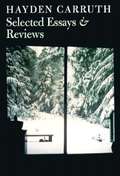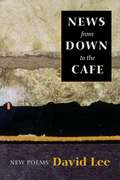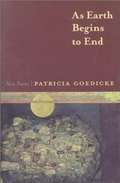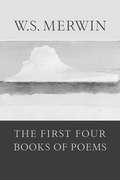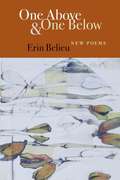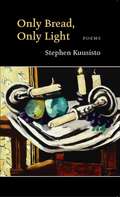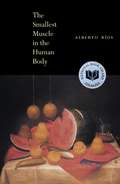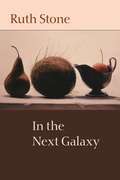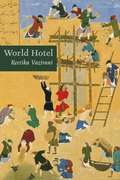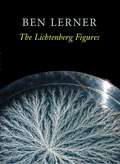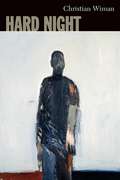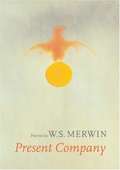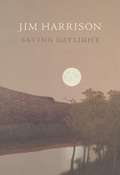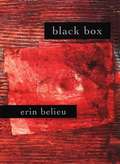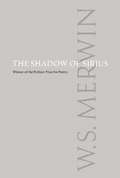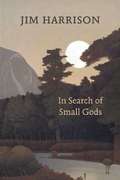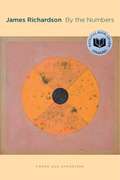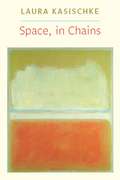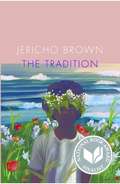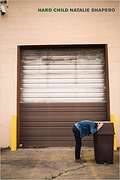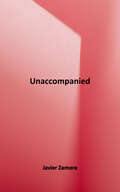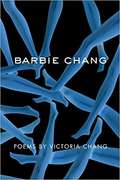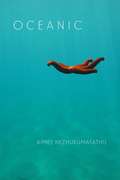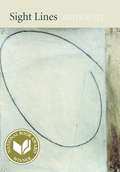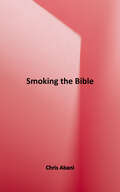- Table View
- List View
Selected Essays and Reviews
by Hayden CarruthThis book is packed with lively anecdotes of the steam era in Utah's Wasatch Range.
News From Down to the Café: New Poems
by David LeeContents: Wayburne Pig, The Wayburne Team, Rhapsody for the Good Night: Christmas Eve, Sonora Portable Music Master (Made in the United States of America) 55 to 500 Kilocycles Table Model, Labor, Blow, Song E.U. Washburn Heard Sung to Tommy Malouf from the Cummings Plot, Sonata in Red, Burn, Righteous, The Relic, The Legend of the Monster in Two Draw, Song E.U. Washburn Heard the Mockingbird Sing Near the Grave of Janie Grace Gosset, Stranger, Private Conversation Overheard from the Booths: Eulogy After the Fact, or Reflections on a Gift from a Magus, The Fish, Land: Overheard Coffeecounter Conversation between Charlie Parks and Tommy Minor, A Hymn for Pearl, A Tale of Ignorance, Stupidity, and Cold Beer without Moderation, E.U. Washburn's Story: Uncle Abe, Housedogs, Classified, Conversation Overheard from a Back Booth on a Tuesday Afternoon After a Weekend Storm, The Twenty-One Gun Salute, Slow, Song E.U. Washburn Heard While Tending Roses over the Grave of Philemon and Baucis Rojas, Old, Epilogue Scribbled on Four Napkins and One Line on the Palm of a Hand While Sitting in a Back Booth with E.U. Washburn.
As Earth Begins to End: New Poems
by Patricia GoedickeThe poems in this collection were written when the author was caring for her husband through his final illness. They reflect the pain of loss and the harsh realities of a marriage that was often filled with strife. Though many of these poems are dark in tone, filled with nightmare images, there are refreshingly bright moments. In one Goedicke describes dancing with her cat in the early-morning kitchen.
The First Four Books of Poems
by W. S. MerwinHalf Roundel I make no prayer For the spoilt season, The weed of Eden. I make no prayer. Save us the green In the weed of time. Now is November; In night uneasy Nothing I say. I make no prayer. Save us from the water That washes us away. What do I ponder? All smiled disguise, Lights in cold places, I make no prayer. Save us from air That wears us loosely. The leaf of summer To cold has come In little time. I make no prayer. From earth deliver And the dark therein. Now is no whisper Through all the living. I speak to nothing. I make no prayer. Save us from fire Consuming up and down. Evening with Lee Shore and Cliffs Sea-shimmer, faint haze, and far out a bird Dipping for flies or fish.
One Above and One Below
by Erin BelieuErin Belieu's debut, Infanta, was selected for the National Poetry Series and quickly sold through its large first printing. Both The Washington Post and the National Book Critics Circle named it as one of the best poetry books for 1993. Now, in her second book, Belieu is proving herself a poet worthy of all the recognition. Coaxing a voice of urban chic from the dirt-filled roots of rural tension, these poems, many of which have appeared in publications such as The New York Times and The Atlantic Monthly, are as captivating as any in American poetry.
Only Bread, Only Light: Poems
by Stephen KuusistoStephen Kuusisto explores blindness and curiosity, loneliness and the found instruments of continuation. Exploiting the seeming contradiction of poetry's reliance upon visual imagery with Kuusisto's own sightlessness, these poems cultivate a world of listening: to the natural world, to the voices of family and strangers, to music and the words of great writers and thinkers.
The Smallest Muscle in the Human Body
by Alberto RíosAlberto Ríos explains the world not through reason but magic. These poems--set in a town that straddles Mexico and Arizona--are lyric adventures, crossing two and three boundaries as easily as one, between cultures, between languages, between senses. Drawing upon fable, parable, and family legend, Ríos utilizes the intense and supple imagination of childhood to find and preserve history beyond facts: plastic lemons turning into baseballs, a grandmother's long hair reaching up to save her life, the painted faith jumpers leaping to the earth and crowd below. This is magical realism at its shimmering best. The smallest muscle in the human body is in the ear. It is also the only muscle that does not have blood vessels; It has fluid instead. The reason for this is clear: The ear is so sensitive that the body, if it heard its own pulse, Would be devastated by the amplification of its own sound. In this knowledge I sense a great metaphor, But I do not want to be hasty in trying to capture or describe it. Words are our weakest hold on the world. -from "Some Extensions of the Sovereignty of Science" "Ríos is onto something new in his poetry, in the way that the real poets of any time always are." -American Book Review. Alberto Ríos teaches at Arizona State and is the author of eight books of poetry, three collections of short stories, and a memoir about growing up on the Mexican border. He is the recipient of numerous awards and his work is included in over 175 national and international literary anthologies. His work is regularly taught and translated, and has been adapted to dance and both classical and popular music.
In the Next Galaxy
by Ruth StoneRuth Stone writes with crackling intelligence from the vantage point of an aging and impoverished woman. Wise, sardonic, crafty, and misleadingly simple, Stone loves heavy themes but loathes heavy poems.<P><P> Winner of the National Book Award
World Hotel
by Reetika Vazirani<P>Born in India and raised in the U.S., Reetika Vazirani is at the forefront of a group of young immigrant writers who are questioning citizenship and the effects of migration and immigration on the discovery of one's self. The topics she writes about--eastern culture meeting west--are both timely and timeless, as she demonstrates a love for storytelling, delights in the music and flavors of the world, and displays a subtle understanding of cross-cultural conflicts for women. <P>Divided into two sections, "Inventing Maya" and "It's Me, I'm Not at Home," World Hotel gives voice to those who are struggling with the burden of being different while also experiencing the thrill of transformation. There are poems written in memory of family members, to husbands, to lovers, and poems from mother to daughter. <P>Through her exquisite formal skills and linguistic range, Vazirani ultimately creates a home in poetry; for her readers she creates penetrating portraits and keen glimpses into a world which-for all its unfamiliarity-we recognize as strikingly similar to our own. <P>The Chapel Hill Rotary invited me twice, and I wore Aunty's yellow sari. I laugh, for ten years I lived on a mountain. I show them Mussoorie. They say it looks like the Blue Ridge. They're fascinated by so much silk-six yards on one girl--but I like dresses and scarves, red nail polish, and I will have to learn to dance. ... -from "Friday Mixer". <P>Born in India, Reetika Vazirani's first book,White Elephants, was selected for the Barnard New Women Poets Prize. She has received much recognition for her poetry, including a Pushcart Prize, a "Discovery" award from The Nation, and inclusion in Best American Poetry. Educated at Wellesley College and the University of Virginia, Vazirani serves as an advisory editor for Callaloo.
The Lichtenberg Figures
by Ben LernerWinner of the Hayden Carruth Award uses "broken sonnets" to explore complex juxtapositions of contemporary culture.
Hard Night
by Christian WimanHard Night is a book of intensity and range. Three long poems define the structure of Hard Night, each variously meditating on art, loneliness, and love. The book culminates with "Being Serious," a birth-to-death biography of Serious, a tragi-comic man who is as entertaining as he is poignant. Interspersed are twenty shorter lyrics that in their formal and musical dexterity, emotional directness, and avoidance of sentimentality recall the work of Frost and Yeats.
Present Company
by W. S. MerwinNew genius work from W. S. Merwin, considered "one of America's greatest living poets." -Washington Post
Saving Daylight
by Jim HarrisonFrom the back cover: Jim Harrison is one of America's most versatile and celebrated writers, and his work as a poet has earned him recognition as an "untrammeled renegade genius." Saving Daylight is Harrison's tenth book of poems, and his first full-length poetry collection in a decade. Honored as a Poetry Book of the Year by Library Journal Kansas City Star "100 Noteworthy Books of the Year" list. Honored as a Michigan Book of the Year. About the Author Jim Harrison is a poet and novelist dividing his year between Montana and the Mexican border.
Black Box
by Erin Belieu"Belieu's poems use a vernacular of their own to suggest a noir world of erotic innuendo and red lights waiting to be run."-Neon. Black Box is a raw, intense book, fueled by a devastating infidelity. With her marriage shattered, Erin Belieu sifts the wreckage for the black box, the record of disaster. Propelled by a blistering and clarifying rage, she composed at fever pitch and produced riveting, unforgettable poems, such as the ten-part sequence "In the Red Dress I Wear to Your Funeral": I root through your remains, looking for the black box. Nothing left but glossy chunks, a pimp's platinum tooth clanking inside the urn. I play you over and over, my beloved conspiracy, my personal Zapruder film-look... When Belieu was invited by the Poetry Foundation to keep a public journal on their new website, readers responded to the Black Box poems, calling them "dark, twisted, disturbed, and disturbing" and Belieu a "frightening genius." All true.
The Shadow of Sirius
by W. S. MerwinThe nuanced mysteries of light, darkness, temporality, and eternity interweave throughout Merwin's newest collection of poems. "I have only what I remember," he admits, and his memories are focused and profound: well-cultivated loves, the distinct qualities of autumnal light, memories of Pennsylvania miners, a conversation with a boyhood teacher, and "our long evenings and astonishment." From the universe's chiaroscuro shadows, Merwin once again calls upon the language of surprise to illuminate existence. He is writing at the peak of his powers.<P><P> Pulitzer Prize Winner
In Search of Small Gods
by Jim HarrisonFrom the author of "Legends of the Fall" comes a book of poems in which birds and humans converse, biographies are fluid, and unknown gods flutter just out of sight.
By the Numbers
by James Richardson"One of America's most distinctive contemporary poets."-Boston Review. "James Richardson's poetry is ... unusual, quirky, personal, and profound."-The Threepenny Review. For James Richardson, poetry is serious and speculative play for both intellect and imagination. By the Numbers is striking for its range of line and movement, for its microlyrics, crypto-quatrains, "ten-second essays," and the twist and snap of aphorisms. Drawing from myriad fables--Ovidian, Shakespearean, georgic, and scientific--Richardson makes familiar scenes strange enough to provoke new and startling insights. "Ten-second Essay #138" Faces are motion, which is why all the photos of you are bad. Even the most natural-looking portrait is a sentence interrupted, one note of an aria, held. Though faces themselves hide a deeper motion. You seem to sit there and meet my eyes across the table, but you are so many other places, clinging here for a moment against all the currents that will soon sweep you onward. We are so moved by the faces caught in the windows of trains going the other way because they tell us how all faces really are. James Richardson is the author of six books of poetry and two critical studies. His poems appear frequently in The New Yorker, Slate, and Paris Review. He is a professor of English and creative writing at Princeton University.
Space, in Chains
by Laura Kasischke"Kasischke's verses walk that perfect Plathian line between the everyday ... and the eternal." --Time Magazine.
The Tradition
by Jericho BrownThe Tradition details the normalization of evil and its history at the intersection of the past and the personal. Brown’s poetic concerns are both broad and intimate, and at their very core a distillation of the incredibly human: What is safety? Who is this nation? Where does freedom truly lie? Brown makes mythical pastorals to question the terrors to which we’ve become accustomed, and to celebrate how we survive.
Hard Child
by Natalie Shapero<p>Thought-provoking and sardonically expressive, Shapero is a self-proclaimed "hard child"--unafraid of directly addressing bleakness as she continually asks what it means to be human and to bring new life into the world.Hard Child is musical and argumentative, deadly serious yet tinged with self-parody, evoking the spirit of Plath while remaining entirely its own. <p>Natalie Shapero has worked as a civil rights lawyer and is currently Professor of the Practice of Poetry at Tufts University. Her first poetry collection No Object was published in 2013, and her writing has appeared inThe Believer, The New Republic, Poetry, andThe Progressive. She lives in Massachusetts.</p>
Unaccompanied
by Javier ZamoraNew York Times Bestselling Author of Solito "Every line resonates with a wind that crosses oceans."--Jamaal May "Zamora's work is real life turned into myth and myth made real life." –Glappitnova Javier Zamora was nine years old when he traveled unaccompanied 4,000 miles, across multiple borders, from El Salvador to the United States to be reunited with his parents. This dramatic and hope-filled poetry debut humanizes the highly charged and polarizing rhetoric of border-crossing; assesses borderland politics, race, and immigration on a profoundly personal level; and simultaneously remembers and imagines a birth country that's been left behind. Through an unflinching gaze, plainspoken diction, and a combination of Spanish and English, Unaccompanied crosses rugged terrain where families are lost and reunited, coyotes lead migrants astray, and "the thin white man let us drink from a hose / while pointing his shotgun." From "Let Me Try Again": He knew we weren't Mexican. He must've remembered his family coming over the border, or the border coming over them, because he drove us to the border and told us next time, rest at least five days, doesn't trust anyone calling themselves coyotes, bring more tortillas, sardines, Alhambra. He knew we would try again. And again--like everyone does. Javier Zamora was born in El Salvador and immigrated to the United States at the age of nine. He earned a BA at UC Berkeley, an MFA at New York University, and is a 2016-2018 Wallace Stegner Fellow at Stanford University.
Barbie Chang
by Victoria Chang"With astringent understatement and wry economy, with nuance and intelligence and an enviable command of syntax and poetic line, Victoria Chang dissects the venerable practices of cultural piety and self-regard. She is a master of the thumbnail narrative. She can wield a dark eroticism. She is determined to tackle subject matter that is not readily subdued to the proportions of lyric. Her talent is conspicuous."―Linda Gregerson "Chang's voice is equal parts searing, vulnerable, and terrified."―American Poets Barbie Chang, Victoria Chang explores racial prejudice, sexual privilege, and the disillusionment of love through a reimagining of Barbie―perfect in the cultural imagination yet repeatedly falling short as she pursues the American dream. This energetic string of linked poems is full of wordplay, humor, and biting social commentary involving the quote-unquote speaker, Barbie Chang, a disillusioned Asian-American suburbanite. By turns woeful and passionate, playful and incisive, these poems reveal a voice insisting that "even silence is not silent." From "Barbie Chang Lives": Barbie Chang lives on Facebook has a house on Facebook street so she can erase herself Facebook is a country with no trees it allows her to believe people love her don't want to cover her Barbie Chang . . . Victoria Chang is the author of three previous poetry books. In 2013, she won the PEN Center USA Literary Award and a California Book Award. Chang teaches poetry at Chapman University and lives in Southern California.
Oceanic
by Aimee NezhukumatathilWith inquisitive flair, Aimee Nezhukumatathil creates a thorough registry of the earth’s wonderful and terrible magic. In her fourth collection of poetry, she studies forms of love as diverse and abundant as the ocean itself. She brings to life a father penguin, a C-section scar, and the Niagara Falls with a powerful force of reverence for life and living things. With an encyclopedic range of subjects and unmatched sincerity, Oceanic speaks to each reader as a cooperative part of the earth, an extraordinary neighborhood to which we all belong.
Sightlines
by Arthur SzeFinalist for the 2019 National Book AwardFrom the current phenomenon of drawing calligraphy with water in public parks in China to Thomas Jefferson laying out dinosaur bones on the White House floor, from the last sighting of the axolotl to a man who stops building plutonium triggers,Sight Lines moves through space and time and brings the disparate and divergent into stunning and meaningful focus. In this new work, Arthur Sze employs a wide range of voices--from lichen on a ceiling to a man behind on his rent--and his mythic imagination continually evokes how humans are endangering the planet; yet, balancing rigor with passion, he seizes the significant and luminous and transforms these moments into riveting and enduring poetry.
Smoking the Bible
by Chris AbaniSmoking the Bible is an arresting collection of poems thick with feeling, shaped by Chris Abani’s astounding command of form and metaphor. These poems reveal the personal story of two brothers―one elegizing the other―and the larger story of a man in exile: exile of geography, culture, and memory. What we experience in this emotionally generous collection is a deep spiritual reckoning that draws on ancient African traditions of belief, and an intellectual vivacity drawing on various wisdom literatures and traditions. Abani illustrates the connective geography between harm, regret, and release, as poems move through landscapes of Nigeria, the Midwestern United States, adulthood, and childhood. One has the sense of entering a whole and complex world of the imagination in reading this collection. There is no artifice here, no affectation; and these poems are a study in the very grace of image.
